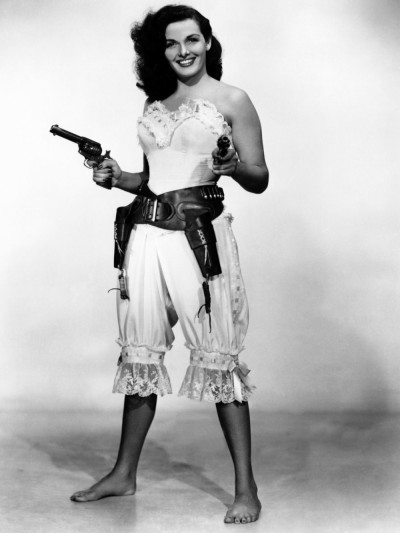★★
“Banda on the run.”
 It has been a while since I’ve scraped the bottom of the barrel of Mexploitation cinema: all those telenovelas don’t count, generally being well-produced and with reasonable production values. Just how reasonable is brought home by comparing them to this… Admittedly, I had to cope with it being entirely in Spanish with no subtitles. I kinda hoped that watching north of four hundred episodes of Hispanic TV would magically instill in me the ability to speak Spanish. Turns out, this is not the case. Who knew? But I think I am on fairly safe ground in declaring this a bargain basement comedy-action cross, which exists to provide PG-rated titillation as much as thrills or laughs.
It has been a while since I’ve scraped the bottom of the barrel of Mexploitation cinema: all those telenovelas don’t count, generally being well-produced and with reasonable production values. Just how reasonable is brought home by comparing them to this… Admittedly, I had to cope with it being entirely in Spanish with no subtitles. I kinda hoped that watching north of four hundred episodes of Hispanic TV would magically instill in me the ability to speak Spanish. Turns out, this is not the case. Who knew? But I think I am on fairly safe ground in declaring this a bargain basement comedy-action cross, which exists to provide PG-rated titillation as much as thrills or laughs.
I’m informed this is the second in a series, which has reached at least three entries (though only this one can be found in the IMDb), so there appears to be sufficient of a local market to justify its existence. It seems to start with the good girls – Los Bikinis Rosas, who do indeed wear pink bikinis – celebrating with their boss after another successful mission. But it’s not long before they are called into action again, going up against the bad-girl gang, the Cobras Negras, for possession of a microchip which… presumably can do something or other of importance. That bit was lost in translation (or lack thereof). No prizes for guessing what shade of bikinis are preferred by the Negras.
This colour co-ordination is probably a good thing, since the four women on each side are almost entirely interchangeable in appearance. The Rosas have a token blonde, while the Negras have a girl in glasses, who is presumably the evil nerd of the bunch or something. [I was basically making up my own plot there.] As appears semi-customary, a masked wrestler shows up, in this case the Rosas getting their training from Huracán Ramírez. Which is impressive, since he died seven years prior to this film’s 2013 release. This would not have fazed the Mexican audience. Luchadors, particularly the masked ones, tend to be near immortal, with characters being passed down the generations, sometimes as “el Hijo de” (the son of), or simply by taking over the mask, as appears the case here.
It’s not very interesting, and has horrible pacing. For example, the Negras seem to have their headquarters located in a basement below a food court at the back of a mall. So, we get to see them – apparently in real time – going through the mall… taking the elevator to the basement… and walking from there to the room in question. It’s a sequence even more gratuitously padded than the characters’ bras. The same goes for the lengthy aerobic exercise training sequence, during which the camera appears fixed, with dedication that’s border-line impressive, on the actresses’ chests and butts. The action is not great either, though is likely stellar in comparison to the stabs at comedy, which appear mostly to consist of a flamboyant homosexual.
Half a star of this is credit for my shortcomings in Spanish, which are likely responsible for some of the issues. While her translation skills may have been helpful, I just couldn’t bring myself to inflict this one on Chris, even though her derisive snorts would have been truly epic to behold.
Dir: Julio Aldama Jr.
Star: Julio Aldama Jr., America Ramírez, Julio Zaizar, Coco Rojo





 Oh, dear. A misbegotten concept – Sweet Home Alabama crossed with Rocky – doubles down with shaky execution, and a non-stop parade of painfully obvious cliches in both characters and plot, to startlingly poor effect. As evidence of the first, imagine a film about a man, dumped by his girlfriend, who decides that beating her up is appropriate revenge. This would not exactly be anyone’s idea of comedy gold. But the makers here think that, simply by reversing the genders, it becomes so. They are very much mistaken. I believe I laughed once.
Oh, dear. A misbegotten concept – Sweet Home Alabama crossed with Rocky – doubles down with shaky execution, and a non-stop parade of painfully obvious cliches in both characters and plot, to startlingly poor effect. As evidence of the first, imagine a film about a man, dumped by his girlfriend, who decides that beating her up is appropriate revenge. This would not exactly be anyone’s idea of comedy gold. But the makers here think that, simply by reversing the genders, it becomes so. They are very much mistaken. I believe I laughed once.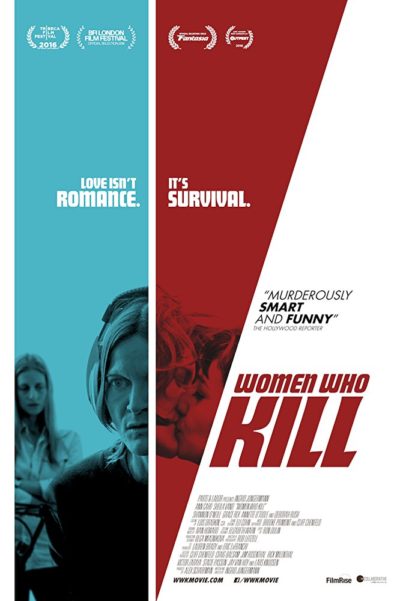 When I told Chris the title of this one, I swear you could hear her eyes rolling at the mere thought of it. But by the end, even she had to admit to having been won over by its dark charms. Most obviously is the sense of black humour which isn’t just dry, it’s as arid as the Atacama Desert. Morgan (Jungermann) and Jean (Carr) are fascinated by female serial killers, running a podcast on the topic which has acquired its own, unique fanbase. Morgan falls for Simone (Vand), a colleague at the food co-operative where she works. But Jean – who is also Morgan’s ex – can’t help thinking there is something seriously off with Simone.
When I told Chris the title of this one, I swear you could hear her eyes rolling at the mere thought of it. But by the end, even she had to admit to having been won over by its dark charms. Most obviously is the sense of black humour which isn’t just dry, it’s as arid as the Atacama Desert. Morgan (Jungermann) and Jean (Carr) are fascinated by female serial killers, running a podcast on the topic which has acquired its own, unique fanbase. Morgan falls for Simone (Vand), a colleague at the food co-operative where she works. But Jean – who is also Morgan’s ex – can’t help thinking there is something seriously off with Simone. After breaking up with her boyfriend, Gloria (Hathaway) holes up in her middle-American hometown. She gets a job in a bar, run by her childhood pal, Oscar (Sudeikis) – not that this employment does much for Gloria’s burgeoning alcoholism. Meanwhile, over in Korea, the city of Seoul is being plagued by a giant monster, which will appear out of nowhere, behave oddly, and then vanish again. Gloria eventually figures out that when she goes through a particular spot – a local children’s playground – at a specific time, the creature appears in Korea, and its actions reflect hers. Turns out Oscar can do the same, manifesting in Seoul as a giant robot, and he may not be as benign with his new-found powers, as Gloria is attempting to be.
After breaking up with her boyfriend, Gloria (Hathaway) holes up in her middle-American hometown. She gets a job in a bar, run by her childhood pal, Oscar (Sudeikis) – not that this employment does much for Gloria’s burgeoning alcoholism. Meanwhile, over in Korea, the city of Seoul is being plagued by a giant monster, which will appear out of nowhere, behave oddly, and then vanish again. Gloria eventually figures out that when she goes through a particular spot – a local children’s playground – at a specific time, the creature appears in Korea, and its actions reflect hers. Turns out Oscar can do the same, manifesting in Seoul as a giant robot, and he may not be as benign with his new-found powers, as Gloria is attempting to be.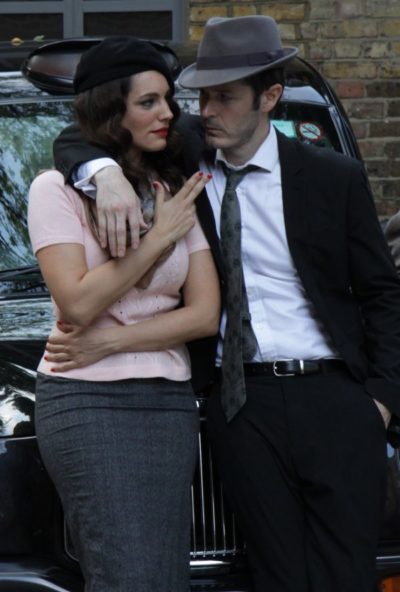 Kate’s (Brook) life has fallen apart: she has just been told the store she works at is closing because the owner is cashing in on a redevelopment offer; her boyfriend has dumped her; and Kate’s attempt at suicide by gas oven is doomed since she failed to pay the bill. What’s a girl to do? The answer is apparently, take inspiration from her heroine, Bonnie Parker. But rather than robbing banks, Kate teams up with her other disgruntled work colleagues, hatching a daring plan to copy the key to the store, seduce the safe combination out of the firm’s accountant, Mat (Williams) and plunder the ill-gotten gains.
Kate’s (Brook) life has fallen apart: she has just been told the store she works at is closing because the owner is cashing in on a redevelopment offer; her boyfriend has dumped her; and Kate’s attempt at suicide by gas oven is doomed since she failed to pay the bill. What’s a girl to do? The answer is apparently, take inspiration from her heroine, Bonnie Parker. But rather than robbing banks, Kate teams up with her other disgruntled work colleagues, hatching a daring plan to copy the key to the store, seduce the safe combination out of the firm’s accountant, Mat (Williams) and plunder the ill-gotten gains. This appears to have been filmed somewhere in South America around 1966, then “poorly translated and dubbed by Germans”. The truth? It’s a modern spoof, a loving re-creation of the sixties Eurospy thriller, featuring two gun-toting leggy lovelies, Bridget (supposedly “Jasmine Orosco”, but actually Wedeen) and Sophia (“Paola Apanapal”, Larsen), who are international fashion supermodels by day, and jet-setting bounty hunters and secret agents by night. They acquire a microchip, capable of storing a whole one kilobyte of data – more than all the computers of Interpol and the Pentagon combined! – which embroils them in an evil plot to unleash wholesale devastation on the world’s population. As you do.
This appears to have been filmed somewhere in South America around 1966, then “poorly translated and dubbed by Germans”. The truth? It’s a modern spoof, a loving re-creation of the sixties Eurospy thriller, featuring two gun-toting leggy lovelies, Bridget (supposedly “Jasmine Orosco”, but actually Wedeen) and Sophia (“Paola Apanapal”, Larsen), who are international fashion supermodels by day, and jet-setting bounty hunters and secret agents by night. They acquire a microchip, capable of storing a whole one kilobyte of data – more than all the computers of Interpol and the Pentagon combined! – which embroils them in an evil plot to unleash wholesale devastation on the world’s population. As you do.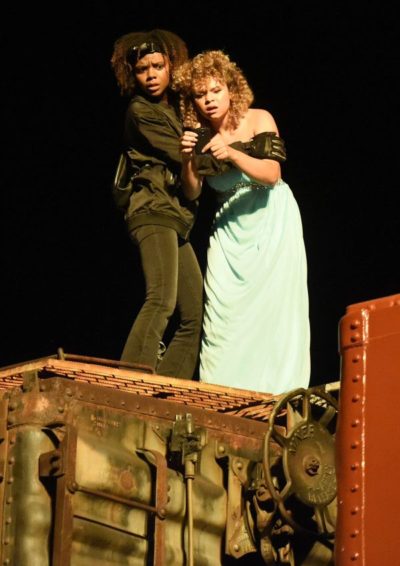 After their mother has a meltdown at her job and ends up in jail: teenage sisters Deidra (Murray) and Laney (Crow, somewhat infamous for her post-elimination meltdown on The X Factor) are left to fend for themselves. With household bills piling up – never mind trying to fund Mom’s bail, or even Deidra’s long dreamed-of college tuition – and Child Protective Services looming, things look bleak. But a visit to deadbeat Dad Chet (Sullivan, channeling David Spade), who works for a railway company, gives Deidra an idea. Hop aboard the freight trains that run by the back of their house, pop open a container to take some goods, and fence them on for cash. Things go surprisingly well, until a disgruntled railroad cop, Truman (Nelson), starts to close in on the pair, intent on rebuilding his reputation after an incident in Arizona.
After their mother has a meltdown at her job and ends up in jail: teenage sisters Deidra (Murray) and Laney (Crow, somewhat infamous for her post-elimination meltdown on The X Factor) are left to fend for themselves. With household bills piling up – never mind trying to fund Mom’s bail, or even Deidra’s long dreamed-of college tuition – and Child Protective Services looming, things look bleak. But a visit to deadbeat Dad Chet (Sullivan, channeling David Spade), who works for a railway company, gives Deidra an idea. Hop aboard the freight trains that run by the back of their house, pop open a container to take some goods, and fence them on for cash. Things go surprisingly well, until a disgruntled railroad cop, Truman (Nelson), starts to close in on the pair, intent on rebuilding his reputation after an incident in Arizona.
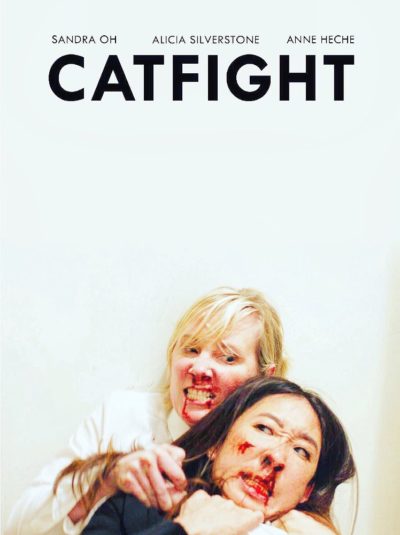 My wife is a big fan of Sandra Oh, for her long-time work on soapy medical drama, Grey’s Anatomy. This is about as far from that as imaginable. It’s a gloriously mean-spirited “comedy” [and I used the quotes out of reverence, not in a bad way], which combines social satire with gleeful hyper-violence, at a level where you would not expect to find serious actresses. Veronica (Oh) and Ashley (Heche) knew each other in college, and have since grown apart. Veronica is now wife to a defense contractor; Ashley a largely unsuccessful artist. They meet at a birthday party, and instantly the hate begins, each representing everything the other finds reprehensible. The night ends in a stairwell brawl, which leaves Veronica in a coma for two years. She awakens, to discover she has lost everything, and Ashley is now on top, enjoying commercial and critical success.
My wife is a big fan of Sandra Oh, for her long-time work on soapy medical drama, Grey’s Anatomy. This is about as far from that as imaginable. It’s a gloriously mean-spirited “comedy” [and I used the quotes out of reverence, not in a bad way], which combines social satire with gleeful hyper-violence, at a level where you would not expect to find serious actresses. Veronica (Oh) and Ashley (Heche) knew each other in college, and have since grown apart. Veronica is now wife to a defense contractor; Ashley a largely unsuccessful artist. They meet at a birthday party, and instantly the hate begins, each representing everything the other finds reprehensible. The night ends in a stairwell brawl, which leaves Veronica in a coma for two years. She awakens, to discover she has lost everything, and Ashley is now on top, enjoying commercial and critical success.
